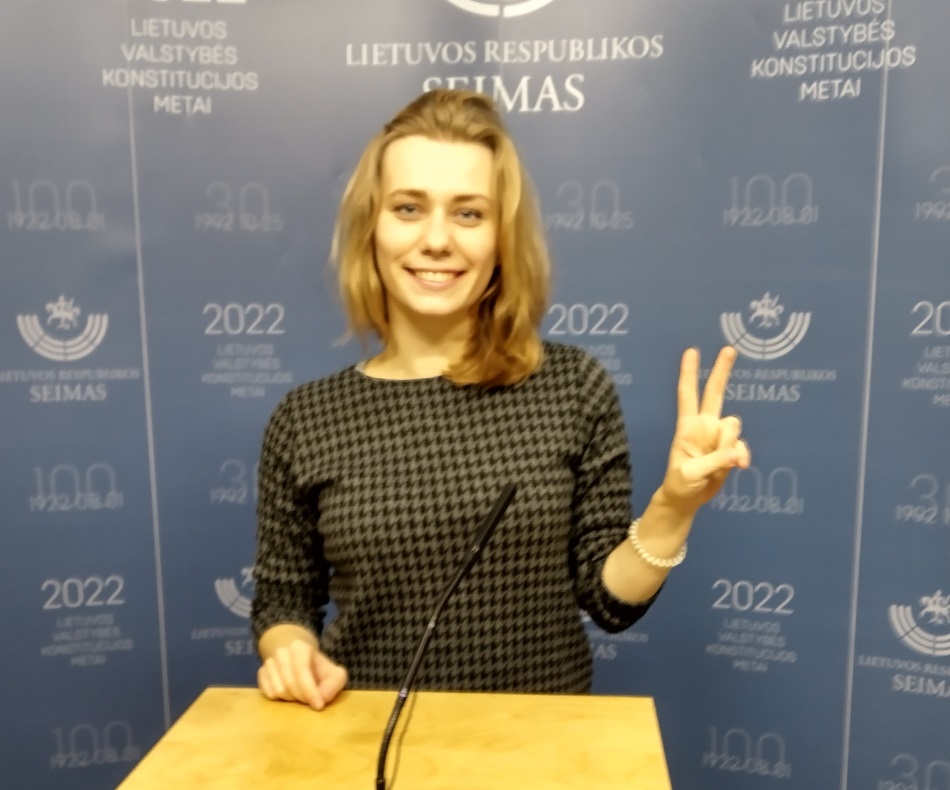Stasys Kaušinis: We would like to know about the foundation you represent – is it called Redut ?
Liia Kotish: I am the founder and director of the Redut Charity Foundation, which was established 2 years ago. We founded it together with war veteran entrepreneurs who wanted to help other war veterans, soldiers and their families, to solve their probelmas and meet their needs. But when the war broke out, the Foundation became active in supporting the military, as it became the most important and “hottest” issue in our country.
S.K.: I think that the Redut Foundation is very much connected to the army and what happened in Kherson. Please accept our congratulations.
L.K.: Yes, it is a success and a joy for those who follow the events on the front and in the country. Thank you for your congratulations. We can say that every territory that our troops have recaptured is very precious, because every time we hear that a village, a town or a region of our territory has been liberated, we are well aware of the cost of the liberation of these territories, and how many of our soldiers and even of the population who were in these occupied territories resisted, how much blood was shed in order for these territories to be liberated from the occupation of the Russian Federation.
S.K.: What is the main assistance that you have provided or are planning to provide to the soldiers throughout the activities of your foundation since its registration. Have the needs changed during this period?
L.K.: Since the outbreak of the all-out war, we have been in contact with the military people we had had the opportunity to get to know during the previous eight years of work, but with a different organisation. So we already had a circle of military contacts, we knew who needed support and help. This meant that we were not looking for new soldiers, as we already had friends and acquaintances who had turned to us for support. We have known these people for a long time and we understand that if they ask for something, that is their real need, they really need support, whether it is warm clothes, means of communication, or whatever else they ask for. We understand that these people will make good use of what we give them as charity.
We have helped these guys and their units in the past. When we have more resources, we will start to work with other units that come to us on the basis of recommendations from soldiers. At the moment, we only work with those we know, knowing that people really need radios, bulletproof vests, boots or whatever.
But providing humanitarian aid is not all we think about and would like to do. We have bigger plans for the Foundation and we are looking for opportunities to implement them. We are thinking about rehabilitating people, because we see that many of them have suffered both physically and psychologically. We will have to do a lot to help them.
S.K.: What was the purpose of your coming to Lithuania, what made you decide to come?
L.K.: Fourteen years ago, we already saw Lithuania as an active ally of Ukraine, which has been providing constant support and assistance to Ukraine. Therefore, we have great confidence in Lithuania and we are very grateful to Lithuania and its individual representatives, members of the Seimas and public figures, who are sincerely helping Ukraine and helping us in this war. So the choice has been made for Lithuania as an ally with whom we can make further plans, work further, so that we can become stronger together, so that we can resist the aggressor, so that we can cope with the consequences of the war for our country. The consequences are people’s lives, their health, which must be restored. There are other things, too, in terms of rebuilding infrastructure and so on. But we want to start small, and if we can do that with Lithuania, it will be a great cooperation between the two countries.
S.K.: This is your first time in Lithuania, what are your impressions?
L.K.: Actually, before I came to Lithuania, I got a lot of information through the news, through friends. We heard that Lithuania is supporting Ukraine and we saw that, and we saw the support and help that is being given. But it was seen as good news, another good support. It was more clear during the trip that we were able to see with our own eyes, to meet the Lithuanian representatives who are directly providing this support and assistance, to see that these are people who really care about our Ukraine and who really want to see a strong Ukraine at this difficult time, in order to resist Russian aggression. That was very surprising. This sincere attitude, this readiness to support us, is not just in words. So it was very unexpected. It was surprising that at every turn, in every city I visited, there were Ukrainian flags with Lithuanian flags. This shows very strong support for our country and that Ukrainians are welcome in Lithuania.
It is painful to see Russian flags flying in the occupied territories of Ukraine. But when we arrive in the territory of a friendly country, it is nice to see Ukrainian flags flying and to know that we are welcome. That is very valuable.
S.K.: You have visited the Seimas, met with politicians. What was your impression?
L.K.: We talked about the situation in Ukraine, about the consequences of the war. It is difficult for the people here to go through the physical suffering, the economic, physical and moral constant pressure that we are going through, knowing that no matter where you are in Ukraine, you are not insured and you can be hit, because the Russian missiles fired into Ukraine can reach any corner of this country. We said that something should be done about the consequences of the war. There are politicians in your country with good experience who are looking to the future and who, even as they watch what is happening in our country, see what needs to be supported and what needs to be emphasised. This is important and it is worth working with people who understand our specific problems and who see ways to solve them. Again, it is to Lithuania’s credit that its politicians are aware of the situation in Ukraine, and it shows that they empathise with us on the situation.
S.K.:As far as I know, you have been in contact with Emanuel Zinger, a member of the European Affairs Committee of the Seimas, and Arvydas Anušauskas, the Minister of Defence of Lithuania. Yes?
L.K.:Yes, I had the opportunity to meet them. In fact, I talked to them because they are particularly empathetic to our events. They are helping Ukraine with project aid and humanitarian aid, and they are influencing foreign economic policy. We are very grateful to them.

S.K.:What are your plans and wishes for the Foundation? How can Lithuania, politicians and NGOs benefit? What are your expectations?
L.K.: Regarding plans. Now we have three priorities. The first one is to continue working with the soldiers, i.e. to provide them with assistance in terms of resources to enable them to continue their service and to carry out effectively the tasks assigned to them, including the liberation of our territories. Yes, the guys are in constant need of communication equipment, drones, cars, because everything I have listed is just material that, even if you provide assistance, after a while, it has to be recovered again – in wartime, with the constant shelling, the guys lose their means of communication and their means of transport in the fight. We will continue to work in this direction. This is the first.
The second is support for military families and veterans. Unfortunately, our armed forces are suffering many losses. Many families have been left without husbands and fathers. Women are also serving in the army. So we are suffering losses here too. Children have become orphans, women widows. This is a big problem. First of all, it is difficult morally and psychologically, because many families have been left without their husbands, who were the only breadwinners. We understand that these families also need to be supported, psychologically supported, with basic support, with resources, so that the families can somehow survive.
Unfortunately, the reality is that some families cannot even meet their basic needs for food, clothing, basic necessities, let alone rest or some kind of psychological recovery, rehabilitation. It is now November and the Christmas holidays are upon us. We would like to support children who are without their parents during the holidays, so that even if they feel a great loss in their families, they still feel that there is something festive, that there is someone there for them, that they are children of heroes.
Because they are the children of heroes, no one will leave them alone with their problems. That is very important. In fact, we are planning to welcome these children, but we will be able to tell you more about that later.
The third priority of the Foundation is rehabilitation. This is the rehabilitation of soldiers and war veterans. As we have previous experience in the rehabilitation and social adaptation of war veterans through various projects (sports, art therapy, working with a psychologist), we know what to do with war veterans and how to rehabilitate them.
The number of war veterans and soldiers is much higher than it was in the 1940s, and the scope of work is also very high. We want to start small and, first of all, rehabilitation for a small number of people. We are looking for partners in Lithuania, because we understand that Lithuania has a good track record in rehabilitation for soldiers. Therefore, it would be great to have partners here who could provide rehabilitation services to Ukrainian soldiers based on the methods already used in previous years.
We are also thinking about opening a rehabilitation centre in Ukraine and we are again looking for partners, because a good, quality project needs strong partners to make it a quality project that reaches as many people as possible. So we are looking for partnership and support in these three areas, so it is too early to talk about the concrete results of the trip to Lithuania. But we are very excited about the friendships and potential partnerships that can be forged as a result of this trip.
S.K.: Thank you for talking to us. We will follow the developments in Ukraine. The country is defending itself with dignity. We wish them a swift and final victory. We wish your Foundation and you personally continued success in implementing your good plans and important ideas. Glory to Ukraine!
L.K.: Glory to the heroes, thank you for your support!
Translated into English from Lithuanian by Aurelija Kuzmaitė.

